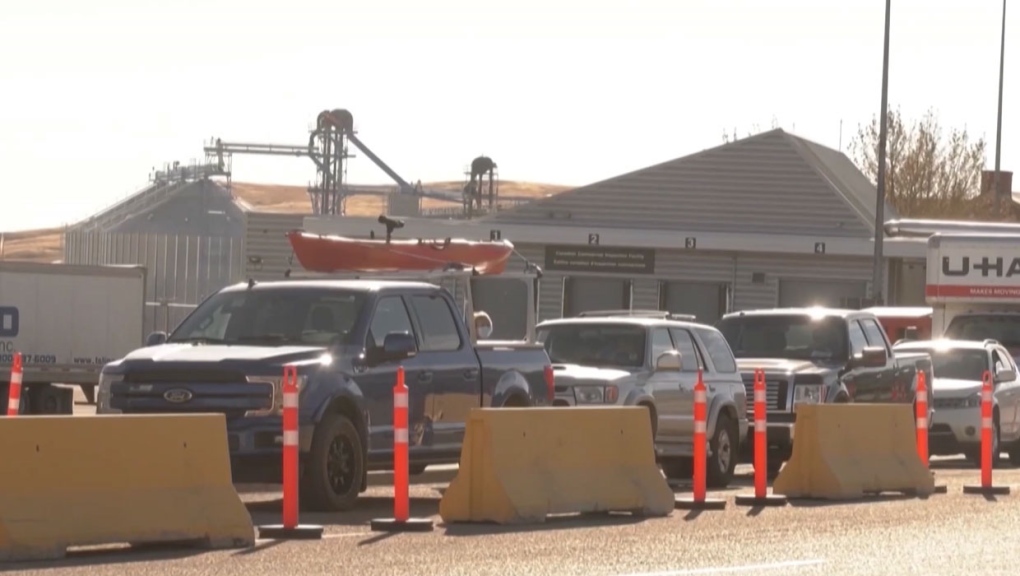Border restrictions extension means a tough month for some Alberta businesses
Some Alberta businesses say they're feeling left behind following an announcement that travel restrictions at the Canada-U.S. border will remain in place for at least another month.
The federal government said Friday the restrictions on non-essential international travel will be kept in place until July 21.
In Calgary, one travel agent said it was a hard thing to hear.
"People are just wanting to know when can we travel or when can we plan that vacation," Travel Time owner Terri Jo Lennox said. "They just want some guidance on that."
Lennox told CTV News she understands the reasoning behind the extension, but was hoping for more information from the government.
"The most unsettling piece of it for both us in the industry and consumers in general is all of the uncertainty, and the lack of information or a plan," she said.
The measures at land crossings have been in place since the onset of the COVID-19 pandemic in March 2020.
The pressure to relax the restrictions has been building from businesses on both sides of the border in recent months.

Alberta's southern-most village has been struggling with the change.
"It continues to hurt our small businesses that depend on traffic going through," Coutts deputy mayor Scott MacCumber said.
It'll also impact summer travellers and the province's tourism industry.
The premier said he'd like to see some exceptions made to help some industries.
"I think most premiers believe that we can, at some point in July, begin receiving folks who have been double dosed," Jason Kenney said Friday.
The federal government is expected to provide details on Monday about plans to let fully vaccinated Canadians and permanent residents enter the country.
Specific details are currently unknown.
Prime Minister Justin Trudeau has previously said that it would take 75 per cent of Canadians getting vaccinated before restrictions at the border could be lifted.
Right now, more than 65 per cent of Canada’s total population has had their first dose and almost 17 per cent are fully vaccinated.
CTVNews.ca Top Stories

Cuban government apologizes to Montreal-area family after delivering wrong body
Cuba's foreign affairs minister has apologized to a Montreal-area family after they were sent the wrong body following the death of a loved one.
What is changing about Canada's capital gains tax and how does it impact me?
The federal government's proposed change to capital gains taxation is expected to increase taxes on investments and mainly affect wealthy Canadians and businesses. Here's what you need to know about the move.
'Anything to win': Trudeau says as Poilievre defends meeting protesters
Prime Minister Justin Trudeau is accusing Conservative Leader Pierre Poilievre of welcoming 'the support of conspiracy theorists and extremists,' after the Conservative leader was photographed meeting with protesters, which his office has defended.
Fair in Ontario, flurries in Labrador: Weather systems make for an erratic spring
"It's a bit of a complicated pattern; we've got a lot going on," said Jennifer Smith of the Meteorological Service of Canada in an interview with CTVNews.ca on Wednesday. "[As is] typical with weather, all of these things are related."
Quebec nurse had to clean up after husband's death in Montreal hospital
On a night she should have been mourning, a nurse from Quebec's Laurentians region says she was forced to clean up her husband after he died at a hospital in Montreal.
Police tangle with students in Texas and California as wave of campus protest against Gaza war grows
Police tangled with student demonstrators in Texas and California while new encampments sprouted Wednesday at Harvard and other colleges as school leaders sought ways to defuse a growing wave of pro-Palestinian protests.
Bank of Canada officials split on when to start cutting interest rates
Members of the Bank of Canada's governing council were split on how long the central bank should wait before it starts cutting interest rates when they met earlier this month.
Northern Ont. lawyer who abandoned clients in child protection cases disbarred
A North Bay, Ont., lawyer who abandoned 15 clients – many of them child protection cases – has lost his licence to practise law.
'My stomach dropped': Winnipeg man speaks out after being criminally harassed following single online date
A Winnipeg man said a single date gone wrong led to years of criminal harassment, false arrests, stress and depression.
































